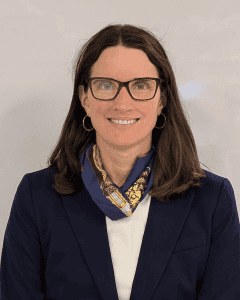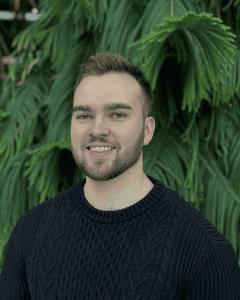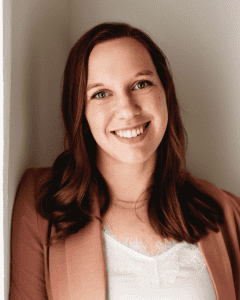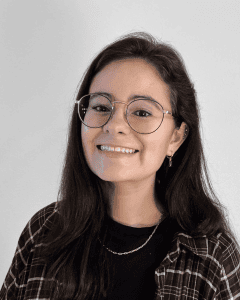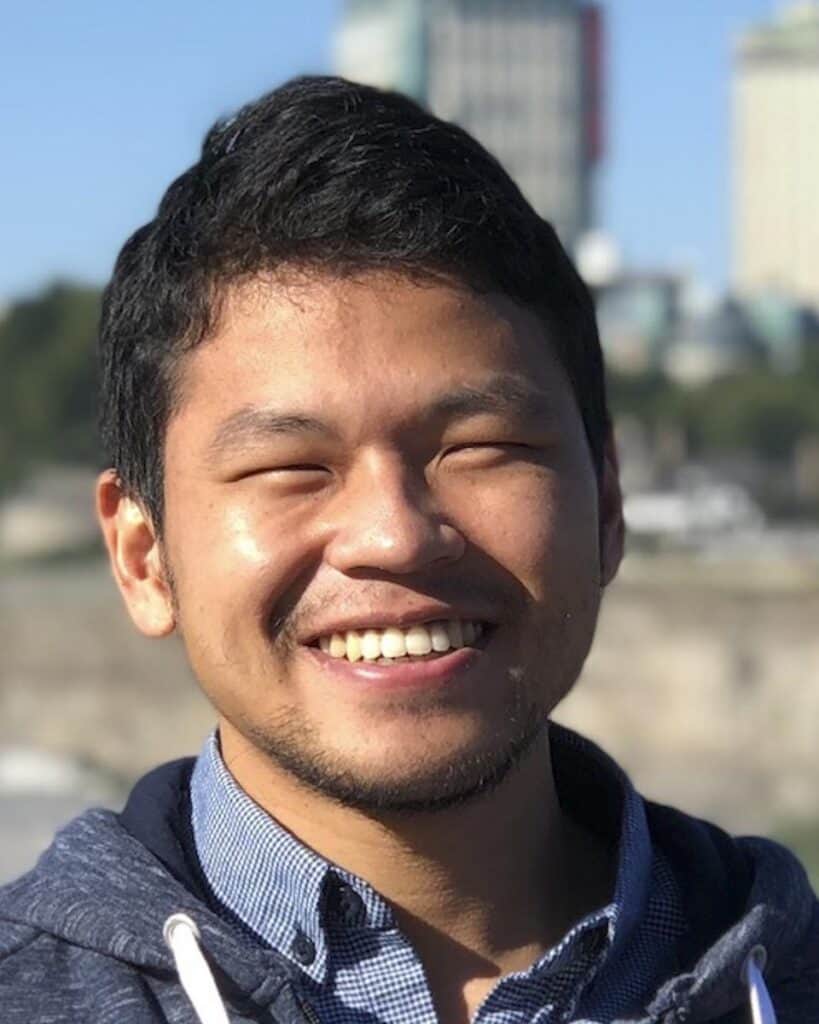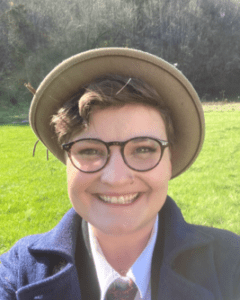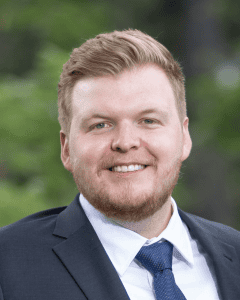We are pleased to invite you to sponsor the VSS 2025 meeting! VSS will hold an in-person meeting on May 16-20, at the beautiful TradeWinds Island Resorts in St. Pete Beach, Florida.
This year marks the tenth year we have held our meeting at the Tradewinds. The City of St. Pete Beach is a barrier island community located just off the mainland of St. Petersburg, just south of Treasure Island, and 20 miles from Clearwater Beach. With miles of pristine, white sandy beaches, year-round sunshine, an abundance of recreational opportunities, restaurants, and shopping, St. Pete Beach is among the most enjoyable places to live and vacation in the world. A short 15 minute drive away, the city of St. Petersburg boasts world-class museums, including the Salvador Dali Museum.
The Vision Sciences Society is committed to progress in understanding vision and its relation to cognition, action and the brain. Our primary goal is to host a yearly meeting where both new and established investigators can present and discuss their work in a relaxed informal setting. Our interdisciplinary nature is reflected by the program committee and review board.
Between 1,500 and 2,000 international researchers will participate in this year’s VSS Annual Meeting. VSS members represent all fields related to vision science.
Sponsorship Types
There are two types of VSS sponsorship: Meeting Sponsorship and Corporate Membership. The levels for each are described below.
Meeting Sponsorship Tiers
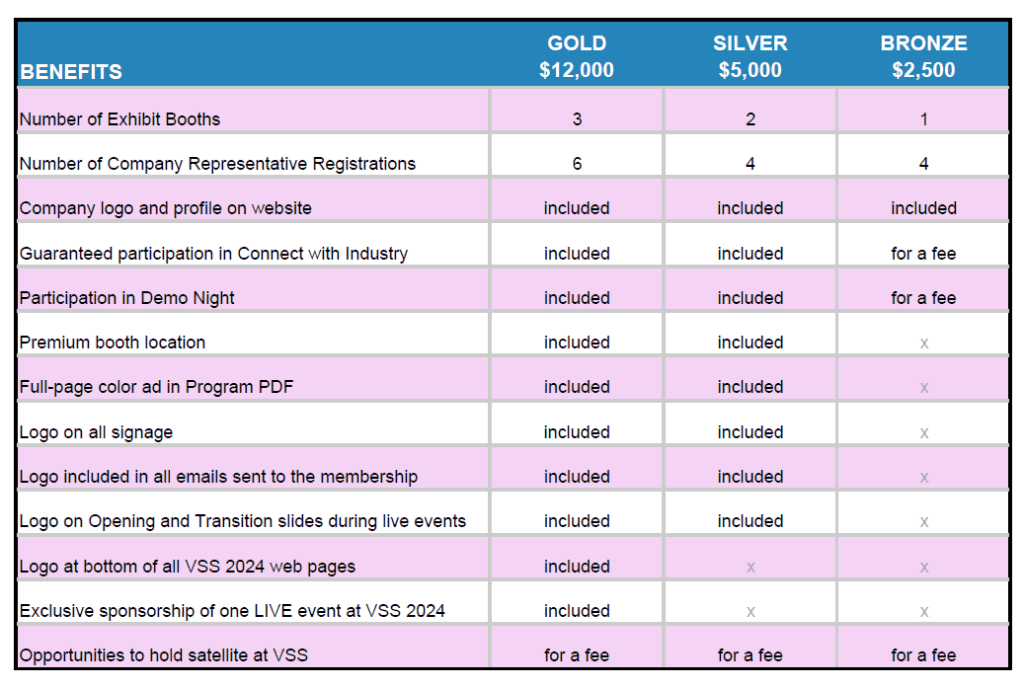
Corporate Membership Levels
Level 2 Membership, $20,000
- All benefits of Gold Sponsorship (if desired)
- Up to 8 employee memberships
- Registration to VSS for those 8 employees
- 2 job ads directed to membership per year
- Guaranteed participation in ‘Connect with Industry’ event
- Option to present at ‘Demo Night’
- Opportunity to host satellite event at annual meeting (additional fees)
Level 1 Membership, $25,000
- All benefits of Gold Sponsorship (if desired)
- Up to 10 employee memberships
- Registration to VSS for those 10 employees
- 3 job ads directed to membership mailing list per year
- Guaranteed participation in ‘Connect with Industry’ event
- Option to present at ‘Demo Night’
- Opportunity to host satellite event at annual meeting (additional fees)
Exhibit Booths at VSS
To exhibit at VSS, you must purchase a Meeting Sponsorship or Corporate Membership.
Sponsorship/Membership applications must be received by February 20, 2025 to receive published pricing. The last day applications will be considered is April 7 (although exhibit space may sell out before that date and space is not guaranteed).
Exhibit booths are located in the Pavilion at the TradeWinds Island Resorts, adjacent to the posters, allowing for maximum visibility to VSS participants. Exhibit space is one 8’ deep by 10’ wide booth, and includes curtain side rails and backdrop, 6’ x 30’’ skirted table, two chairs, and identification sign.
Exhibit space is assigned on a first-come, first-served basis. (Silver and Gold sponsors will receive first choice/premium spaces.) Please read our Exhibitor Agreement for hotel policies, set-up and tear-down instructions, insurance requirements, and other guidelines.
Thank you for your interest. Exhibit space is now fully booked and the application is closed. Please contact us at if you are interested in customizing a sponsorship package.
Exhibit Hours
| Friday, May 16 | |
| Exhibits load-in and set up | 4:00 – 7:00 pm |
| Saturday, May 17 | |
| Exhibits load-in and set up | 7:00 – 9:00 am |
| Exhibits open | 8:00 am – 5:30 pm |
| Morning poster session | 8:30 am – 12:30 pm |
| Afternoon poster session | 2:45 – 6:45 pm* |
| Sunday, May 18 | |
| Exhibits open | 8:00 – 5:30 pm |
| Morning poster session | 8:30 – 12:30 pm |
| Afternoon poster session | 2:45 – 6:45 pm* |
| Monday, May 19 | |
| Exhibits open | 8:00 am – 12:30 pm |
| Morning Poster Session | 8:30 am – 12:30 pm |
| Tuesday, May 20 | |
| Exhibits open | 8:00 am – 5:30 pm |
| Morning poster session | 8:30 am – 12:30 pm |
| Afternoon poster session | 2:45 – 6:45 pm |
| Exhibitor Tear-down | 5:30 – 8:30 pm |
*Exhibit area will be stanchioned off at 5:30 pm and linens will be offered to cover exhibit tables.
Important Dates
| February 20, 2025 | Deadline to submit early sponsorship applications, and receive published pricing |
| March 3, 2025 | Deadline to submit logo and company description for VSS website |
| April 2, 2025 | Deadline to submit ads for the program |
| April 7, 2025 | Deadline to submit late sponsorship applications |
| April 15, 2025 | Booth assignments complete |
*Applications received after February 20 will incur an additional charge of $250 for late processing.
Additional Sponsorship Opportunities
Coffee Break Sponsorship – $2000
Gain exclusive visibility with our Coffee Break Sponsorship! As the sole sponsor of a designated coffee break, your organization will be featured on event signage, ensuring high exposure. You’ll also have a dedicated table during the break to share information, engage with attendees, and make meaningful connections.
Meeting Lanyards – $3000
Place your branding around the necks of our attendees, ensuring maximum visibility throughout the entire event with our exclusive Lanyard Sponsorship! All registered attendees are required to wear badges at all times, making this a high-impact opportunity to showcase your logo. Your branding will be prominently displayed on the lanyards worn by every participant, providing continuous exposure in sessions, networking events, and throughout the venue.
If you are interested in customizing a sponsorship package please contact us at .

